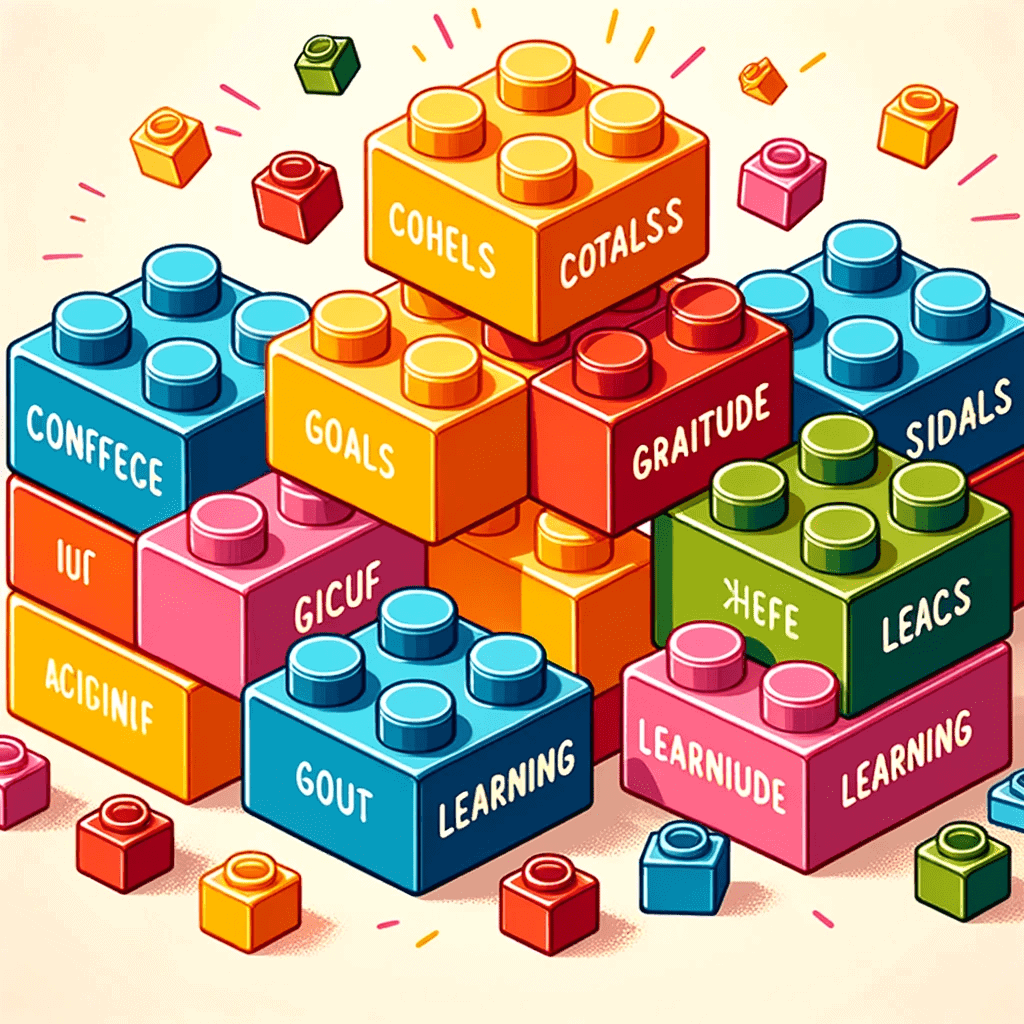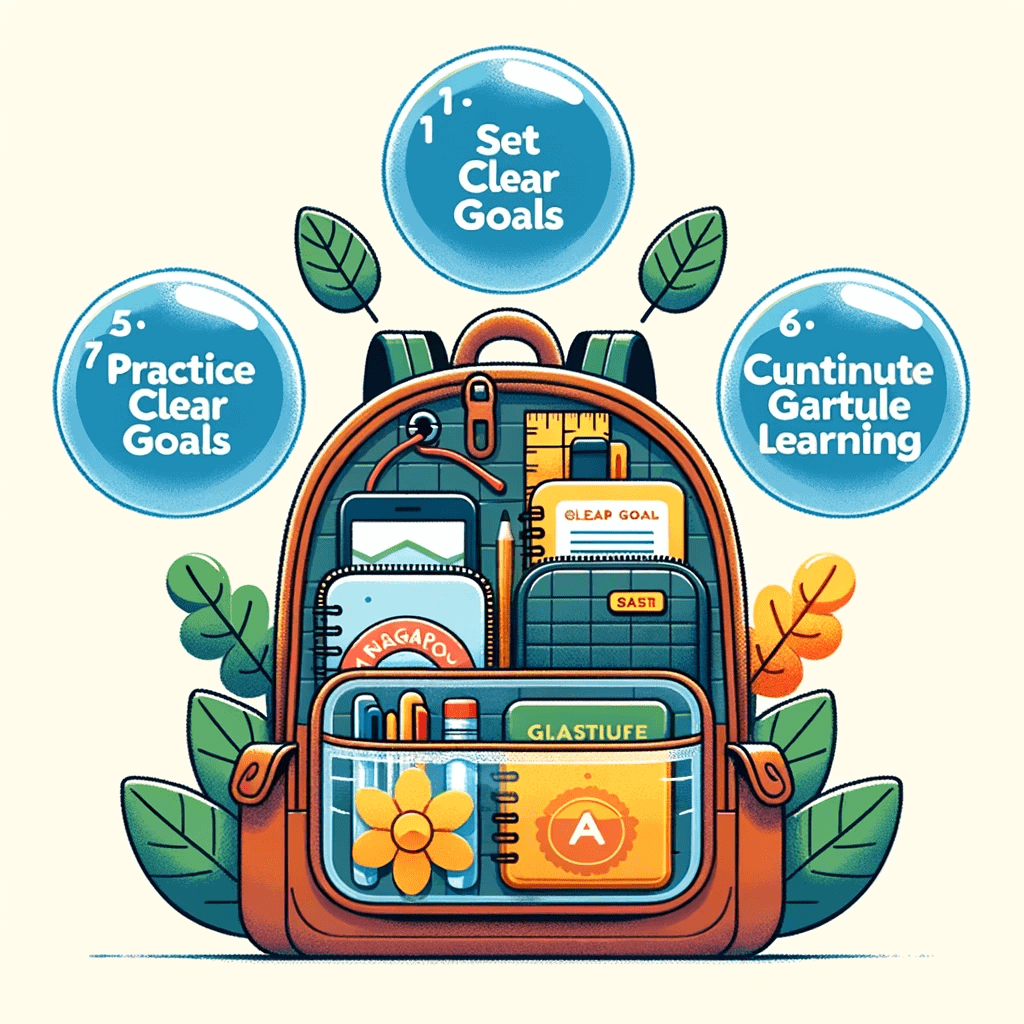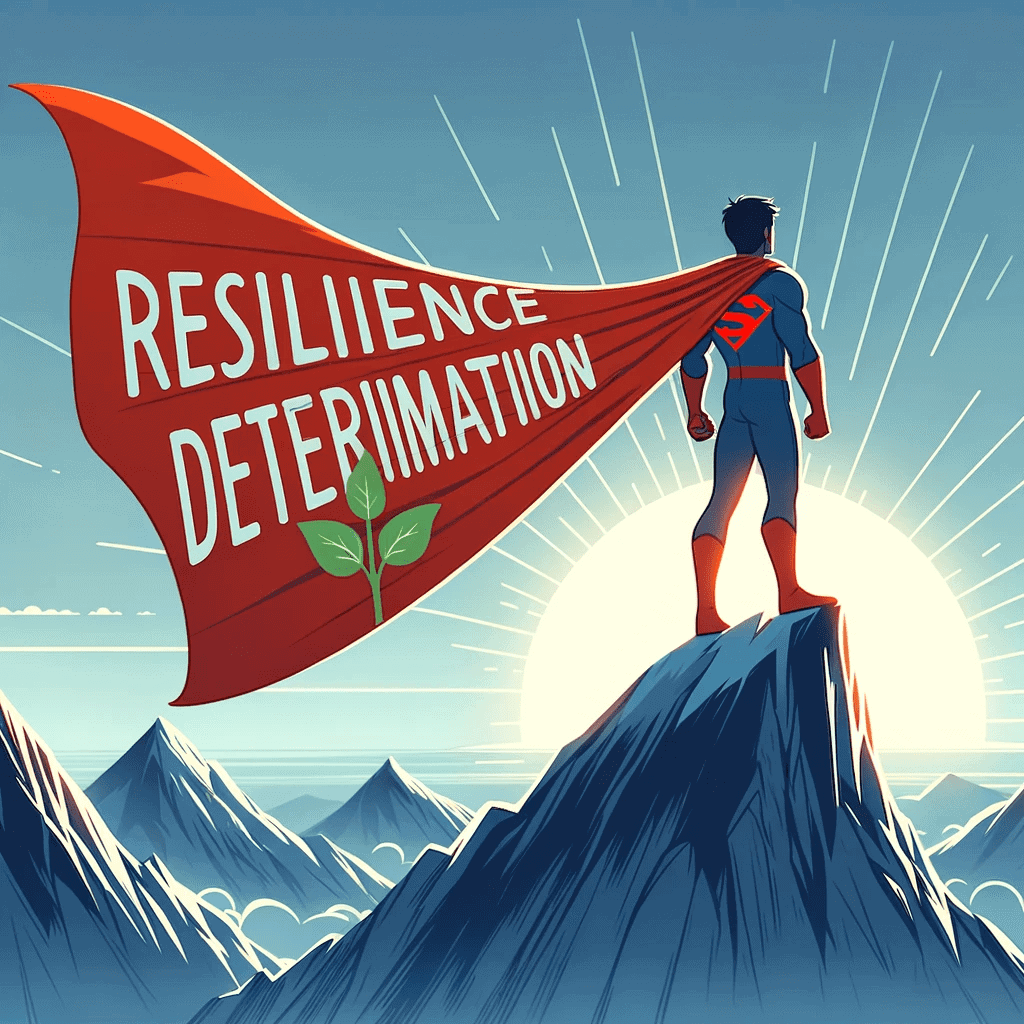Last updated on August 25th, 2025
If you’re anything like me, you know that life is one big, exciting journey of growth. We’re all on our own unique paths, but guess what?
There are some habits for personal growth that can help every single one of us hit those life goals, whether it’s climbing up the career ladder or becoming a better person.
Think of these habits as the building blocks—the Lego pieces, if you will—of a life you can be super proud of, both in your personal world and in your career.
So, buckle up! In this blog post, we’re diving deep into these life-changing habits. They’ve got the power to send you rocketing towards your own version of success.
What is Personal Growth?
Personal growth is all about becoming the best version of yourself. It’s like going on a never-ending journey where you’re the hero.
This journey isn’t just about improving your job skills or earning more money. It’s about enhancing your whole life, including your confidence, your relationships, and even your happiness.
Just like every superhero needs special tools or powers to defeat the villain, you need specific habits to succeed on your journey. These habits aren’t magical spells, but they’re close enough!
They help you navigate the challenges you’ll face, propelling you toward success and happiness.
Best of all? These habits for personal growth work for everyone—they’re universal!
What’s Special About These Habits?
These habits are like the strong foundation for the life you want to build. Whether you want to do better at work or feel more confident in yourself, these habits help you get there.
Next, we’ll go into detail about each of these important habits. We’ll explain why they matter and give you simple ways to include them in your daily routine.
Ready to kick your self-improvement into high gear? Keep reading, and let’s dig into these awesome habits for personal growth together!
Habit 1: Set Clear Goals – Your Personal GPS on the Road to Success
Imagine setting out on a road trip without knowing your destination. You might have a fun adventure, but you’ll likely end up lost or going in circles.
The same applies to life. If you don’t have clear goals, you’re essentially drifting aimlessly. Setting goals acts like a GPS for your life, guiding you towards your desired destination.
It narrows down the infinite possibilities and choices to a manageable path that you can focus on.
How It Affects Different Areas of Life
- Career: Whether you’re climbing the corporate ladder or running your own startup, setting goals helps you decide what steps you need to take next.
- Personal Development: Goals can steer your personal growth journey, be it in building self-esteem, improving your skills, or even in specialized areas like cybersecurity.
- Health and Well-being: Whether it’s losing weight or achieving a better work-life balance, setting clear goals makes the path easier to navigate.
How to do it: Your Action Plan
1. Use the SMART Criteria to Set Your Goals
S – Specific: Get into the details. Instead of saying “I want to get healthy,” say “I’ll walk 10,000 steps every day.”
M – Measurable: Pick goals you can track. For example, you can count those 10,000 steps with a step-counter.
A – Achievable: Be real with yourself. If you’ve never worked out, planning to run a marathon in a month is a bit much.
R – Relevant: Make sure your goals fit with what you want in life. For example, don’t aim to be a top chef if you’re really into cybersecurity.
T – Time-bound: Give yourself a deadline. Knowing you have only so much time helps you stay focused and get things done.
2. Prioritize Your Goals
Not every goal is the same. Some are more important or need to be done sooner. Sort your goals into:
- Short-term Goals: Stuff you want to do in the next few months.
- Medium-term Goals: Things you’re aiming for in the next year or two.
- Long-term Goals: Big dreams that might take many years to reach.
3. Create an Action Plan with Deadlines
Split each goal into smaller steps and give each one a due date. This makes your goals feel easier and gives you a plan to follow.
For instance, if you want to get better at cybersecurity, you could do:
Week 1: Look for and pick an online course.
Week 2-8: Finish the course, spending at least 5 hours each week on it.
Week 9: Use what you’ve learned in a real project or at your job.
Habit 2: Practice Gratitude – The Ultimate Fuel for Your Journey
Why It Matters: More Than Just Saying “Thank You”
Being thankful is like putting oil in your car—it makes life run more smoothly and makes everything better.
Feeling grateful allows you to be present, to focus on what you have rather than what you don’t.
This good feeling isn’t just for fun; it actually helps you face problems and gives you the energy to go after your goals.
How Gratitude Transforms Various Aspects of Life
- Mental Health: Saying thanks regularly can help lower stress and worry, making life’s problems easier to handle.
- Relationships: Being grateful makes your relationships stronger, whether it’s with friends, family, or coworkers.
- Self-Esteem: Giving yourself credit for your own achievements and being thankful for them can significantly boost your self-confidence and self-worth.
How to Be More Thankful:
1. Keep a Thank-You Notebook
Keeping a notebook where you write what you’re thankful for is an easy way to feel better.
How to Do It:
- Spend a few minutes every day, either when you wake up or before bed, writing down 3-5 things you’re happy about.
- These can be small things like a pretty sunset or big deals like getting a promotion at work.
- Look at your notebook when you’re feeling low to cheer yourself up.
2. Say Thanks to People Often
Don’t keep your thanks to yourself. Saying thanks makes you feel even better and helps your relationships.
How to Do It:
- Make a habit of saying thank you for even small favors.
- Send a quick thank-you text or email to friends or coworkers who help you out.
- You can even give people public shoutouts in meetings or on social media to say thanks.
3. Think About Your Wins and What Makes You Happy
Spend some time thinking about the good stuff you’ve done and what you’re thankful for. This helps you feel ready for any challenge.
How to Do It:
- Once a week or month, think about what you’ve achieved.
- Celebrate your wins, no matter how small they seem.
- Also think about the people and moments that helped you win, and be thankful for them.
When you’re full of thanks, it’s easier to tackle anything that comes your way.
Habit 3: Continuous Learning – The Ever-Sharpening Blade of Personal Growth
Why It Matters: Stagnation is Not an Option
The world’s always changing, right? That’s why the old saying “the more you know, the better” still holds true today.
Gone are the days when you could learn one thing and call it a day. Now, learning all the time isn’t just a good idea, it’s a must-do.
If you want to get ahead in your job, or just make your life better, you need to keep learning new things.
How Learning Helps You in Life:
- Getting Ahead at Work: The more you know, the more useful you are at work, which could mean a better job or more pay.
- Self-Improvement: Learning isn’t just about work. Whether it’s a new hobby, a new language, or just getting better at chatting with people, learning makes life better.
- Being Flexible: Learning helps you deal with changes in your life. This is especially true if you work in a field that’s always changing, like cybersecurity.
How to Keep Learning:
1. Read Widely
Reading’s a great way to learn. But don’t limit yourself to just one type of material.
How to Do It:
- Choose a diverse range of subjects and genres—stories, facts, science, art, tech, you name it.
- Set aside a specific time each day for reading. Even just 15 to 30 minutes can make a big difference over time.
- If you’re super busy, try book summaries or listen to audiobooks
2. Attend Events and Workshops
While books provide a wealth of knowledge, Events and workshops are another great way to learn.
How to Do It:
- Find events that you’re interested in, either near you or online.
- Get involved—ask questions and talk to people.
- Use what you’ve learned as soon as you can, so you don’t forget it
3. Stay Current in Your Field
Especially crucial for those in specialized sectors, staying current ensures you are always at the forefront of your field.
How to Do It:
- Sign up for newsletters or magazines related to what you do.
- Follow people in your field on social media.
- Join online groups where people talk about the latest news in your area.
Habit 4: Managing Your Time Well – The Secret Sauce of Success
Why It’s Important: Time is Like Money
Think of time like money. Once you use it, you can’t get it back. Managing your time well is really important if you want to do well in life.
Wasting time can make you stressed and miss out on good chances. It can also make you feel unhappy.
How Time Management Helps in Different Parts of Life:
- Getting Things Done: When you manage your time well, you can do more, whether it’s at work or for yourself.
- Having Free Time: Good time management means you’ll have more time to relax, hang out with people, and take care of yourself.
- Reaching Your Goals: When you set aside time for your goals, you keep making progress
How to Manage Your Time:
1. Use Tools Like Pomodoro or Time-Blocking
Pomodoro Method
- Pick a task you want to do.
- Set a timer for 25 minutes and work until the timer rings.
- Take a 5-minute break. After four rounds, take a longer break.
Time-Blocking
- Divide your day into chunks of time for different tasks.
- Try to stick to your plan as much as you can.
- Change your plan as you learn what works and what doesn’t.
2. Drop or Delegate Tasks That Don’t Help Yous
- List all the things you do in a week.
- Find tasks that don’t help you reach your goals.
- Stop doing these tasks, or give them to someone else if you can’t avoid them.
3. Prioritize Tasks Based on How Important and Urgent They Are
- Sort tasks into categories like Important/Urgent, Important/Not Urgent, and so on.
- Spend most of your time on Important tasks.
- Try not to spend time on tasks that are not Important or Urgent.
Habit 5: Exercise and Physical Well-being – The Pillar Supporting Your Mental Fortress
Why It’s Important: A Fit Body Makes for a Fit Mind
We often get so busy that we forget to take care of our bodies. But ignoring your physical health can mess with your mind and your whole life.
A healthy body helps you think clearly, feel good, and handle stress better.
Why You Should Take Care of Your Body:
- Mental Clarity: Regular exercise releases endorphins and other neurochemicals that enhance your mood and mental clarity.
- Stress Relief: Physical activity is a proven method to reduce stress and anxiety, helping you to face challenges more calmly.
- Increased Energy: When you’re healthy, you have more energy for everything you need to do.
How to Do It:
1. Exercise for At Least 30 Minutes Most Days
- Pick something you like to do, like running, yoga, or even dancing.
- Try to do it for at least 30 minutes a day. If you’re really busy, even a quick 15-minute workout can help.
- Be consistent. Aim to exercise most days of the week.
2. Eat a Balanced Diet
- Plan your meals to include all the essential nutrients—carbohydrates, proteins, fats, vitamins, and minerals.
- Avoid excessive sugar and processed foods. Opt for whole grains, fruits, vegetables, lean meats, and healthy fats.
- Drink plenty of water and limit the intake of sugary drinks and excessive caffeine.
3. Get Good Sleep
- Try to get 7-9 hours of good sleep every night. Make sure where you sleep is comfy and quiet and conducive to rest.
- Stick to a regular sleep schedule, even on weekends.
- Avoid caffeine and looking at screens right before bed to help you wind down..
Taking good care of your body isn’t just about being healthy. It also helps you deal better with stress, think more clearly, and have more energy for all the things you want to do.
Your body is like a car that takes you through life. Take good care of it, and your ride through life will be a lot better.
Habit 6: Develop Resilience – The Bounce-Back Factor in Personal Growth and Success
Why It’s Important: Life Will Throw Surprises, It’s How You Handle Them That Counts
Whether it’s a failed venture, a personal loss, or a sudden change in circumstances, life is full of unexpected challenges.
However, the ability to bounce back from these setbacks—known as resilience—is what sets the trajectory for continued growth and success.
Resilience isn’t just about being tough; it’s a skill you need for dealing with life’s challenges big and small.
Why Being Resilient Is Good:
- Emotional Stability: Resilience can act as an emotional buffer, helping you maintain your composure during stressful situations.
- Problem-Solving: A resilient mindset usually comes with a can-do attitude, you see challenges as things you can solve, not problems that stop you.
- Long-Term Success: Resilience helps you keep going after your goals, even when things get tough, thus ensuring sustained progress and long-term success.
How to Do It:
1. Adopt a Growth Mindset
- Recognize that abilities and intelligence can be developed. You’re not stuck to your present circumstances or limitations.
- View challenges as opportunities to grow rather than insurmountable obstacles.
- Embrace failure as a learning experience, not as a sign to give up.
2. Surround Yourself with Positive Influences
- Look at who’s around you. Do they uplift you or bring you down?
- Spend time with mentors, friends, and even online communities that help you grow, align with your goals and can provide emotional and intellectual support.
- Stay away from people who are always negative. Limit your time with “energy vampires”—those who consistently drain your energy with negativity.
3. Learn from Failures and Setbacks
- If something goes wrong, stop and think about why it happened without blaming yourself.
- Find out what you can do differently next time.
- Get back out there and try again, using what you’ve learned to do better.
Being resilient is key to dealing with the hard stuff life throws at you and coming out stronger on the other side. It’s not about never falling down; it’s about getting back up every time you do.
By working on being more resilient, you’re setting yourself up for a life where you’re not just surviving challenges but turning them into chances for growth and success.
Habit 7: Make Friends and Connect – Your Network is Your Net Worth
Why It’s Important: No One Is an Island in the Journey of Personal Growth and Success
You’ve heard it before: “It’s not what you know, it’s who you know.” This is true in all areas of life.
Having a good network of friends and contacts gives you a safety net when times are tough and opens up new opportunities for you.
Your network can serve multiple functions: as a support system for emotional resilience, as a treasure trove of opportunities, and as a fountain of knowledge and expertise that you might not have access to otherwise.
What Networking Does for You:
- Emotional Support: Your network can offer advice and emotional support when you’re going through a hard time.
- Career and Business Opportunities: A recommendation from a trusted contact can open doors that might otherwise remain closed.
- Knowledge and Skill Enhancement: Interacting with people from diverse backgrounds and expertise can provide you with insights and skills that are helpful for personal growth and success.
How to Build Your Network:
1. Attend Industry Events and Social Gatherings
- Identify conferences, seminars, and social events where individuals relevant to your field are likely to gather.
- Don’t just attend; participate. Ask questions, join discussions, and make it a point to meet and greet.
- Follow up. Send a thank-you email or a connection request on professional networks like LinkedIn.
2. Use Social Media Wisely
- Use platforms like LinkedIn, Twitter, and industry-specific forums to follow thought leaders, join relevant groups, and participate in discussions.
- Share valuable content that demonstrates your expertise and interest in your field.
- Don’t hesitate to reach out for advice or offer your own when someone asks. A simple comment or message can sometimes turn into a fruitful relationship.
3. Build and Maintain Relationships by Offering Value
- Networking is not a one-way street. Think about how you can offer value to your contacts, be it through your expertise, your own network, or other resources.
- Keep in touch. Send an occasional email or message updating your contacts on what you’re doing and asking them about their own projects.
- Celebrate their successes and offer your support during their challenges. A relationship is built on mutual care and respect.
Networking isn’t just about collecting names or business cards. It’s about building real relationships that help both people get ahead
Final Thoughts: Effective Habits for Personal Growth and Success
Personal growth and success are not destinations but ongoing journeys that require commitment, resilience, and a strong sense of purpose.
While the road may be bumpy with challenges, remember that each obstacle is also an opportunity—an opportunity to learn, to adapt, and to evolve into a better version of yourself.
The seven habits we’ve explored are the threads that, when woven together, create the rich tapestry of a fulfilling life.
- Set Clear Goals: Your map for making choices in life.
- Being Thankful: Keeps you steady when things get tough.
- Continuous Learning: Your tool kit for dealing with our fast-changing world.
- Managing Your Time: Your guide for using your daily 24 hours wisely.
- Exercise and Physical Well-being: Your fuel for the mind and the body’s engine.
- Develop Resilience: Your armor against life’s inevitable surprises.
- Network and Build Relationships: Your travel buddies who help you and whom you can help..
Making these habits part of your everyday life, you’re building a strong foundation for a bright future full of growth and good times.
Each habit works together with the others, giving you a complete plan for dealing with whatever life throws at you.
So, as you continue on this exciting journey of personal growth and winning in life, keep these habits close. They’ll show you the way and also help you see how far you’ve come.
Here’s to you becoming the best you can be. Keep going and keep growing!








